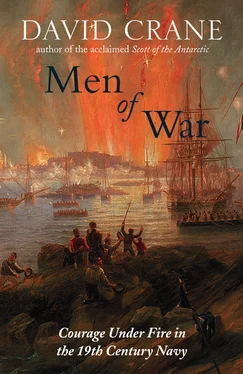with whom we have been Philandering for so long, in fact from the hour that Sebastiani [Napoleon’s envoy to the Porte] knew of the Treaty of Tilsit, Sir A. Paget [Britain’s Ambassador] might have departed, as it was (between friends) it ended in them at last sending him away & saying they would not receive any more flags of Truce from the ship he was in. We in my opinion did wrong in forbearing from making war on them during the negotiations … had we done as we have since done, take burn & destroy, I seriously believe they might have made peace with us … Now I understand they want to begin a negotiation, we are not now at war they say & it is no prize money to us Captains, but I would like to know what name can be given to our footing with that nation, we must coin a word. I alone destroyed or took twelve of their vessels, only four of which are in Malta, who is to account for the rest?
‘Take burn & destroy’ – it might have been the motto of the Mediterranean fleet – and whatever his fears over the legal status of his prizes, they were never going to stop Stewart when the chance came. Through the early months of 1808 the Sea Horse had been constantly engaged in capturing or destroying cargo bound for Constantinople, and when on 1 July, while riding at anchor off the island of Sira, wind came of bigger game with the news that, in defiance of Collingwood’s agreement, a substantial Turkish flotilla had come through the Dardanelles to punish their rebellious Greek subject, Stewart did not hesitate.
The same day he began working the Sea Horse up from Sira against a north-north-easterly, and at noon on the fifth he received confirmation of the Turkish movements from a Greek ship bound for Malta. Taking advantage of a light south-easterly the Sea Horse immediately made all sail, and at 5.45 p.m. saw between the islands of Skopelos and Dromo two enemy men-of-war, the twenty-six-gun Alis-Fezan and the larger and more powerful fifty-two-gun, 1,300-ton Badere-Zaffer , Captain Scandril Kitchuc-Ali.
Stewart had, in fact, been expecting far longer odds for the forty-two-gun Sea Horse , and faced with only two opposing vessels, closed on the Turkish ships until at 9.30 he was near enough to hail the Turkish commodore and demand his surrender. ‘This Captain Scandril flatly refused,’ William James, prize court judge, historian and shamelessly partisan hammer of the American navy, wrote, ‘and into the hull of the Badere-Zaffer went a whole double-shotted broadside of the Sea Horse. Nor was the Turkish frigate slow in returning the fire. In this way, with the wind a light breeze about two points abaft the starboard beam, the two frigates went off engaging; the Badere-Zaffer gradually edging away to close her consort, who was about a gun-shot distant.’
For the next half-hour the two ships manoeuvred for position, with the heavier and better-manned Badere-Zaffer attempting to board, and Stewart employing all his seamanship to fight the battle on his terms. At 10 o’clock he had again got his ship on the larboard quarter of his enemy when the Alis-Fezan interposed herself, taking from Sea Horse at a range of no more than a cable’s length a devastating starboard broadside that within ten minutes had driven her out of the action.
As the Alis-Fezan limped burning into the Aegean night, her crew decimated by the Sea Horse ’s gunnery, her hull racked by explosions, Stewart turned his attention back to the Badere-Zaffer . The Turkish captain was as determined as before to exploit his overwhelming advantage in manpower, but as the two ships ran before the wind exchanging broadsides and Captain Scandril again closed to board, Stewart swung the Sea Horse across the Badere-Zaffer’s bow – losing her gaff vangs and mizzen and starboard mizzen back-stays to the enemy bowsprit as he did so – and raked her crowded forecastle with grape from his stern-chase guns as she passed.
Outsailed and outgunned as they were, the Badere-Zaffer’s crew gave place to no one when it came to courage, and the two ships continued to exchange broadsides until the Turkish cannon at last fell silent. As the Badere-Zaffer settled helpless in the water, shortly after I o’clock in the morning, her mizzen, fore and main topmasts all gone, her hull so badly shot up she could barely float, Stewart brought the Sea Horse under her stern and hailed her to surrender. A desultory fire from her after-guns was the only answer, and with one last starboard broadside, Stewart, ‘finding that his shattered opponent would neither answer nor fire, very prudently, and very humanely too, hauled off; and, after standing on a little further, brought to on the starboard tack to wait for daylight’.
It took one more broadside, and a mutiny of the Badere-Zaffer ’s surviving officers – who hauled down her colours from the shattered stump of her mizzenmast while they held the half-mad Scandril in his chair – to end the engagement, but shortly after dawn it was over. ‘Sent the 1st Lieut to take possession of her,’ the Sea Horse ’s log recorded, with a characteristically laconic indifference to the human drama: ‘she proved to be the Badere Zaffer a large Turkish frigate, a complement of 540 men commanded by Scandali Kichuc Ali, Captain. Her consort’s name was the Alex Fesan carrying 24 brass guns and two mortars. The enemy lost 170 killed and 200 wounded, ours 5 seamen killed [two next to Hastings when a gun blew up] & ten wounded and two dangerously.’
For all the good the Badere-Zaffer ever did the Sea Horse ’s crew – the prize court refused to buy her for the navy – Scandril might as well have succeeded in a last-ditch attempt to scuttle her, but Stewart was determined to add her to the growing haul of bombards, brigs, schooners, wine, ‘senna and austrich feathers’ that he had already sent back to Malta. Over the next days her battered hull was made seaworthy enough to be towed, a skeleton crew was detained to man their prize on the voyage back to Valetta, and a Greek vessel bound for Constantinople ‘co-opted’ to repatriate their prisoners.
It was not long before the Sea Horse was following them, because with a demi-thaw in diplomatic relations between Britain and the Ottoman Empire, she was back again at Malta in September to receive on board another old friend of Sir Charles’s, Britain’s new ambassador to the Porte, Mr Robert Adair. Through the previous months the Turks had done all they could to stall negotiations, and even in a more conciliatory atmosphere it was the end of January 1809 before the ship’s company was again manning the yards to salute ‘His Excellency Mr Adair the Ambassador on his disembarking’ at Constantinople. ‘The walls of the Seraglio are like the walls of Newstead,’ another young English aristocrat, Lord Byron, on his travels with his old Cambridge friend and future philhellene John Cam Hobhouse, recorded of his first impressions of the ‘polis’,
but the ride by the walls of the city on the land side is beautiful, imagine four miles of immense triple battlements covered with Ivy, surmounted with 218 towers, and on the other side of the road Turkish burying grounds (the loveliest spots on earth) full of enormous cypresses, I have seen the ruins of Athens, of Ephesus, and Delphi, I have traversed great parts of Turkey and many other parts of Europe and some of Asia, but I never beheld a work of Nature or Art, which yielded an impression like the prospect on each side, from the Seven Towers to the End of the Golden Horn.
To a young naval midshipman like Hastings, though, it was the seaward defences of Constantinople that would have been of most interest. The captains who formed part of Sir John Duckworth’s abortive expedition were adamant that the city had been there for the taking if they had only been allowed, and over the next two months of diplomatic inactivity and interminable salutes, Hastings had all the opportunity he could want to assess those defensive frailties that were still exercising his mind twenty years later.
Читать дальше











